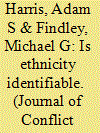| Srl | Item |
| 1 |
ID:
128956


|
|
|
|
|
| Publication |
2014.
|
| Summary/Abstract |
Ethnicity is frequently posited as an important factor in civil violence and other political contexts. Despite the attention that ethnicity receives, its effects depend on an important, but mostly ignored, assumption that ethnicity is identifiable within and across groups. There is likely considerable variation in peoples' abilities to identify each other. Certain individuals within groups might be better at identifying others' ethnicities; further, different types of information might aid identification better. We contend that the strength of an individual's ethnic identity influences her ability to identify others correctly. We test this argument using an experiment in the Eastern Cape of South Africa in which individuals attempted to identify members of the major black ethnic groups. We find that the average individual struggles to identify ethnicity correctly in many conditions. Individuals with a stronger identity, however, are often better at correctly identifying the ethnicity of others relative to the average individual. When receiving contradictory information, individuals with stronger identities were sometimes deceived more easily than others. These results have implications for a diverse set of studies relying on the identifiability assumption.
|
|
|
|
|
|
|
|
|
|
|
|
|
|
|
|
| 2 |
ID:
156708


|
|
|
|
|
| Summary/Abstract |
Does foreign aid enable or constrain elite capture of public revenues? Reflecting on prominent debates in the foreign aid literature, we examine whether recipient preferences are consistent with a view that foreign donors wield substantial control over the flow of aid dollars, making elite capture more difficult and mass benefits more likely. We compare elite and mass support for foreign aid versus government spending on development projects through a survey experiment with behavioral outcomes. A key innovation is a parallel experiment on members of the Ugandan national parliament and a representative sample of Ugandan citizens. For two actual aid projects, we randomly assigned different funders to the projects. Significant treatment effects reveal that members of parliament support government programs over foreign aid, whereas citizens prefer aid over government. Donor control also implies that citizens should favor foreign aid more and elites less as their perceptions of government clientelism and corruption increase. We explore this and report on other alternative mechanisms. Effects for citizens and elites are most apparent for those perceiving significant government corruption, suggesting that both sets of subjects perceive significant donor control over aid.
|
|
|
|
|
|
|
|
|
|
|
|
|
|
|
|